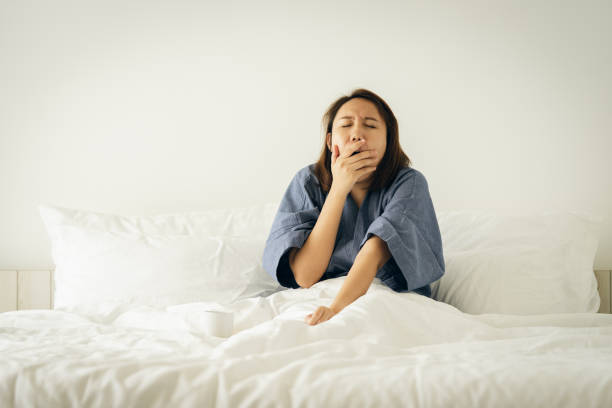When we talk about adequate sleep, many people immediately think of how many hours they should spend in bed. But adequate sleep goes far beyond just duration it involves achieving the right balance between sleep quantity and sleep quality. Adequate sleep means that your body is cycling smoothly through the various stages of sleep, including light sleep, deep sleep, and REM sleep, each of which plays a vital role in restoring different aspects of your health. During these cycles, your brain consolidates memories, your body repairs itself, and your immune system is strengthened. Simply staying in bed for 7 to 9 hours doesn’t mean you’re getting adequate sleep if those hours are disturbed or spent in shallow stages. If you wake up frequently, snore heavily, or suffer from insomnia, you may be missing out on essential sleep stages that impact cognitive and physical performance. True adequate sleep should leave you feeling refreshed, mentally clear, emotionally balanced, and physically energized the next day. If that’s not the case, then it’s time to evaluate your sleep quality and not just how long you stay in bed. Adequate sleep is the foundation of long-term wellness, affecting everything from mood to metabolism.
1. What Is Adequate Sleep? Understanding More Than Just Hours
Despite its importance, most people underestimate what adequate sleep truly means, often ignoring its effects until chronic issues like fatigue, anxiety, or poor concentration become unavoidable. The misconception that sleeping more automatically equals better rest often leads to frustration when people don’t feel better after long nights in bed. This is because adequate sleep isn’t just about time it’s about getting restorative sleep that heals and energizes both the body and mind. For example, if your sleep is constantly interrupted by environmental factors like noise, temperature changes, or digital screens, your body doesn’t enter the deep or REM phases enough to benefit from the time spent sleeping. As a result, even eight or nine hours of sleep might leave you groggy or mentally sluggish. Establishing routines like turning off electronics before bed, reducing caffeine intake, and setting consistent sleep and wake times can help your body achieve the kind of rest it truly needs. When you prioritize quality over quantity, you begin to notice improved energy, clearer thinking, and better mood stability. Adequate sleep is not a luxury it’s a biological requirement that, when neglected, compromises every system in your body. Investing in sleep is investing in your daily performance and long-term health.
2. Is 8 Hours the Gold Standard or Just a Myth?
The idea that everyone needs exactly eight hours of sleep has been repeated so often that it feels like scientific law but the reality is far more individualized. Adequate sleep varies widely between people based on age, genetics, stress levels, health status, and even how efficiently someone cycles through sleep stages. While eight hours may be a useful average, it is not a one-size-fits-all rule. Some people function optimally on just six and a half hours of high-quality sleep, while others need nine to feel mentally and physically refreshed. What really matters is whether your sleep is restorative, not just lengthy. Adequate sleep means waking up feeling alert, staying energized throughout the day, and not requiring excessive caffeine or naps to stay functional. Instead of rigidly aiming for eight hours, focus on how you feel and function after a night’s sleep. Tracking tools, sleep diaries, or simply observing patterns in your own performance can help you better understand your personal sleep requirement. The eight-hour rule is a helpful starting point, but achieving adequate sleep is about matching your body’s needs not someone else’s guideline. Prioritizing how your sleep impacts your day is far more meaningful than hitting a specific number.
Another reason the “eight-hour myth” persists is due to population-level research, which suggests most adults need between 7 and 9 hours of sleep per night. But that statistic is based on averages, not tailored recommendations. What’s often left out of the conversation is sleep efficiency how much actual sleep you get relative to the time spent in bed. Two people may both sleep for eight hours, but if one spends most of that time tossing and turning while the other cycles deeply through restorative stages, only one of them is truly getting adequate sleep. Your lifestyle also plays a huge role. Athletes, shift workers, students, and parents of young children all have unique stressors and recovery needs that can shift the goalpost for adequate sleep. Additionally, some people naturally wake up earlier or later due to chronotypes another biological factor affecting how much sleep you need and when you need it. So, instead of stressing over reaching the eight-hour mark, assess whether you wake up naturally, feel mentally sharp, and have stable energy levels. Adequate sleep is about honoring your body’s signals and optimizing your routine not blindly chasing a number that may not apply to your unique needs.
3. Why Sleep Duration Alone Doesn’t Guarantee Adequate Sleep
Many people assume that if they’re spending seven to nine hours in bed, they’re automatically getting adequate sleep but that’s a misconception. Sleep is not a uniform state; it consists of multiple stages including light sleep, deep sleep, and REM sleep, which cycle throughout the night. If your sleep is fragmented due to noise, stress, or health issues you may not progress through these stages properly. This means you can get a full night’s sleep in terms of hours but still wake up feeling tired, foggy, or unrefreshed. Adequate sleep is defined not only by how long you sleep, but also by the structure and continuity of your sleep cycles. When those cycles are interrupted, the restorative processes that occur in deep and REM stages are cut short, leading to physical fatigue, impaired memory, and reduced emotional resilience.
To ensure you’re getting adequate sleep, focus on both quantity and quality. Using sleep trackers or apps can help you identify patterns such as frequent wake-ups or shallow sleep. Improving your sleep environment by reducing light, noise, and screen exposure before bed can significantly improve sleep quality. Avoid alcohol and caffeine in the evening, as both interfere with deeper sleep stages. Remember, eight hours of poor-quality sleep is not equivalent to six hours of high-quality, uninterrupted rest. Aim to create the conditions that allow your body to cycle naturally through all sleep stages, so you can wake up feeling genuinely restored. Only when sleep is consistent, uninterrupted, and restorative can it truly be considered adequate sleep.
4. The Role of REM and Deep Sleep in Achieving Adequate Rest
REM (Rapid Eye Movement) sleep and deep sleep are the two most critical stages of the sleep cycle, and without them, you cannot achieve truly adequate sleep. Deep sleep also known as slow-wave sleep is when your body undergoes its most intense physical recovery. This stage is essential for immune system function, tissue growth and repair, and hormone regulation. REM sleep, on the other hand, is associated with brain activity, learning, memory consolidation, and emotional processing. During a typical night, your body cycles through several rounds of deep and REM sleep, and each one plays a unique role in helping you feel mentally sharp and physically energized the next day.
If you’re skipping or getting too little of either stage whether due to stress, alcohol, late-night screen time, or an inconsistent schedule then your sleep may not be adequate, even if you’re sleeping for a full eight hours. For instance, people with untreated sleep disorders like sleep apnea often miss out on deep and REM sleep, leading to chronic fatigue despite long nights in bed. To improve these restorative stages and ensure adequate sleep, establish consistent bedtime routines, reduce screen exposure, manage stress, and consider using sleep tracking devices. By prioritizing both REM and deep sleep, you’re not just sleeping you’re healing, learning, and restoring yourself on every level. That’s the true hallmark of adequate sleep.
5. How Your Age and Lifestyle Affect Adequate Sleep Requirements
Adequate sleep requirements aren’t static they change significantly with age and are heavily influenced by your lifestyle. For example, infants may need up to 16 hours of sleep, teenagers require about 8–10 hours, and most adults function well on 7–9 hours. However, the aging process alters sleep architecture; older adults often experience lighter sleep and wake more frequently, which may reduce the quality of their rest even if the duration remains the same. Your level of physical activity, diet, mental health, and stress all interact with your sleep needs. For someone with a physically demanding lifestyle or high stress levels, more restorative sleep may be necessary to properly recover.
Furthermore, lifestyle habits such as consuming alcohol, smoking, working night shifts, or excessive screen use before bedtime can negatively impact sleep quality and prevent you from getting adequate sleep. These behaviors may shorten deep and REM sleep stages, leaving you feeling unrested despite spending enough time in bed. Prioritizing a consistent sleep routine, limiting stimulants, staying active during the day, and managing stress can help align your lifestyle with your body’s sleep needs. To achieve adequate sleep, it’s essential to regularly assess how your current phase of life and daily habits are affecting your rest and recovery.
6. Circadian Rhythm: The Internal Clock That Controls Your Sleep Needs
Your circadian rhythm is your body’s internal 24-hour clock that regulates various biological processes, including your sleep-wake cycle. It determines when you feel alert or drowsy, influencing when your body naturally craves rest. To achieve adequate sleep, it’s vital to keep your circadian rhythm aligned with natural day and night patterns. Disruptions such as jet lag, shift work, or erratic sleep schedules can throw off this internal clock, making it harder to fall asleep, stay asleep, or wake up feeling rested. Even if you get eight hours of sleep during the day after a night shift, your body may still not process that rest as adequate due to circadian misalignment.
Exposure to natural light during the day and avoiding artificial light at night helps regulate this internal clock. Adequate sleep is more easily achieved when your sleep schedule is consistent and synced with your biological rhythm. People who constantly stay up late or sleep in on weekends often experience “social jet lag,” where their sleep schedule differs from their internal clock, leading to poor sleep quality. To support circadian health and ensure adequate sleep, aim to go to bed and wake up at the same time daily, get sunlight exposure in the morning, and avoid screens close to bedtime.
7. Sleep Deprivation Warning Signs: Are You Getting Adequate Sleep?
Recognizing whether you’re getting adequate sleep goes beyond simply tracking how long you’ve been in bed. Sleep deprivation, even if subtle or short-term, can creep in and impact your mood, productivity, and overall health. Warning signs include persistent fatigue, difficulty concentrating, mood swings, irritability, and memory problems. Physical symptoms such as frequent yawning, headaches, weakened immunity, or increased appetite for sugary foods are also red flags. If you’re regularly experiencing these issues, it’s likely that you’re not getting adequate sleep either in quantity, quality, or both.
Chronic sleep deprivation, even when mild, can have serious long-term effects on your body and brain. It increases the risk of depression, anxiety, obesity, cardiovascular issues, and metabolic dysfunction. Often, people grow accustomed to feeling tired and don’t realize how much better they could feel with adequate sleep. It’s important to listen to your body and not normalize poor sleep. If you need caffeine to function, frequently nod off during the day, or wake up groggy even after a full night’s rest, your sleep might be inadequate. Addressing these signs early by adjusting your habits or consulting a healthcare provider can help you return to a healthier, more energized version of yourself through proper, adequate sleep.
8. How to Track and Measure Your Own Adequate Sleep Levels
Measuring whether you’re getting adequate sleep has become easier thanks to modern technology. Tools like fitness trackers, smartwatches, and sleep apps can monitor your sleep duration, stages, and even sleep disturbances like restlessness or apnea. These devices provide insights into how much time you spend in each stage of sleep (light, deep, REM), which is essential to assess the quality of your rest. Simply tracking hours is not enough knowing how restorative your sleep is can help you identify patterns and make adjustments for improvement.
Besides gadgets, keeping a sleep journal is a powerful low-tech method to identify whether you’re getting adequate sleep. Document your bedtime, wake time, how many times you woke up during the night, and how you felt the next day. Over time, this will reveal how your behaviors like screen time, diet, or stress affect your sleep quality. If data shows you’re sleeping enough hours but still waking up tired, it suggests a lack of adequate sleep due to poor sleep quality. With the information from tracking tools, you can experiment with changes to your routine, such as adjusting your bedtime, limiting caffeine, or improving your sleep environment to boost your sleep adequacy.
9. Why 6 Hours Might Be Enough for Some and Too Little for Others
One of the most misunderstood aspects of adequate sleep is the idea that everyone needs the same number of hours. While many experts recommend 7–9 hours for adults, there are outliers who thrive on as little as six hours without any signs of fatigue or impairment. These people may be genetically predisposed to require less sleep, a trait seen in short-sleeper syndrome. For them, six hours of high-quality, uninterrupted sleep can still be adequate sleep if they wake up refreshed, stay focused, and maintain stable energy and mood throughout the day.
On the other hand, most people do not fall into this category and may suffer consequences if they try to survive on just six hours. Poor concentration, irritability, weakened immunity, and emotional instability are common indicators that six hours is insufficient. What’s important is to assess your own performance, energy levels, and mental clarity, rather than aiming for a universal number. If you feel unrested or need stimulants to stay awake, then six hours is likely not providing you with adequate sleep. Instead of comparing yourself to others, focus on how you feel and perform. Adequate sleep is a personal requirement, not a competition or benchmark.
10. The Impact of Poor Sleep Quality Even If You Sleep 8+ Hours
Getting eight hours of sleep is often considered the gold standard, but it’s entirely possible to sleep that long and still not get adequate sleep. If your sleep is interrupted, restless, or lacks the deep and REM stages necessary for restoration, your body and brain won’t receive the full benefits. Common causes of poor sleep quality include stress, alcohol consumption, sleep apnea, an uncomfortable sleep environment, or inconsistent sleep schedules. These factors prevent your body from cycling properly through the sleep stages that contribute to memory consolidation, muscle recovery, and emotional balance.
Many people with poor sleep quality wake up feeling groggy, experience brain fog during the day, and rely on caffeine to stay alert—even after what appears to be a full night of rest. In these cases, the issue is not sleep duration, but the lack of adequate sleep. Solutions include improving sleep hygiene, such as keeping a cool, dark room, establishing a calming bedtime routine, and minimizing screen exposure before bed. It’s also worth consulting a healthcare provider if sleep disorders are suspected. Ultimately, adequate sleep is measured not just by hours spent in bed, but by how refreshed, focused, and energetic you feel the next day.
11. Can You Catch Up on Adequate Sleep Over the Weekend?
Many people try to repay sleep debt by sleeping in on weekends, assuming this helps restore their energy levels. While this can offer temporary relief, it does not fully compensate for a week of insufficient or poor-quality sleep. Adequate sleep is not just about recovery—it’s about maintaining a consistent sleep pattern that aligns with your circadian rhythm. When you disrupt that rhythm by drastically changing your sleep times on weekends, it can actually make it harder to fall asleep during the week and lead to “social jet lag.”
Studies show that although sleeping in for a day or two can ease some symptoms of sleep deprivation like fatigue or irritability it doesn’t restore full cognitive function or repair the immune and hormonal disruptions caused by chronic lack of adequate sleep. The most effective approach is to prioritize getting adequate sleep every night rather than relying on weekend catch-up. Stick to consistent sleep and wake times, even on weekends, to maintain your body’s internal clock. This will improve sleep quality and help you feel more refreshed throughout the week. Adequate sleep isn’t something you should save up for it’s something your body needs on a regular basis to function optimally.
12. Tips to Improve Your Sleep Quality and Reach Adequate Sleep Naturally
Achieving adequate sleep naturally involves developing habits that promote both quality and quantity of rest. First, establish a consistent sleep schedule even on weekends so your circadian rhythm can regulate itself. A regular wake-up time anchors your internal clock and makes falling asleep easier. Second, create a calming bedtime routine that includes dim lighting, quiet time, and relaxing activities like reading or meditating. This helps signal to your brain that it’s time to wind down and prepare for deep, restorative sleep.
Additionally, limit exposure to blue light from screens at least an hour before bed, and avoid caffeine, nicotine, and alcohol in the evening. These substances can interfere with your ability to enter the deep and REM sleep stages that are essential for adequate sleep.





One Comment